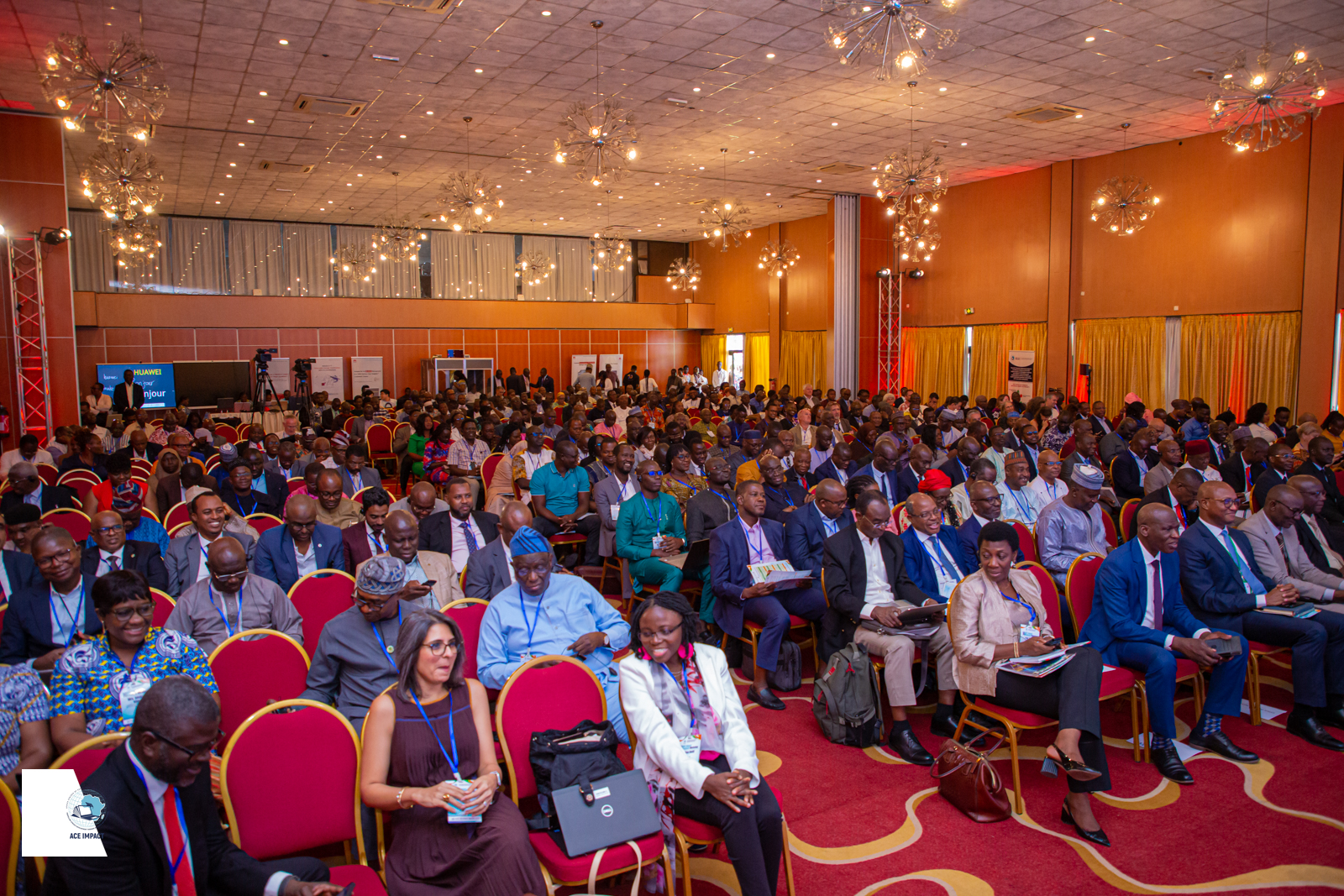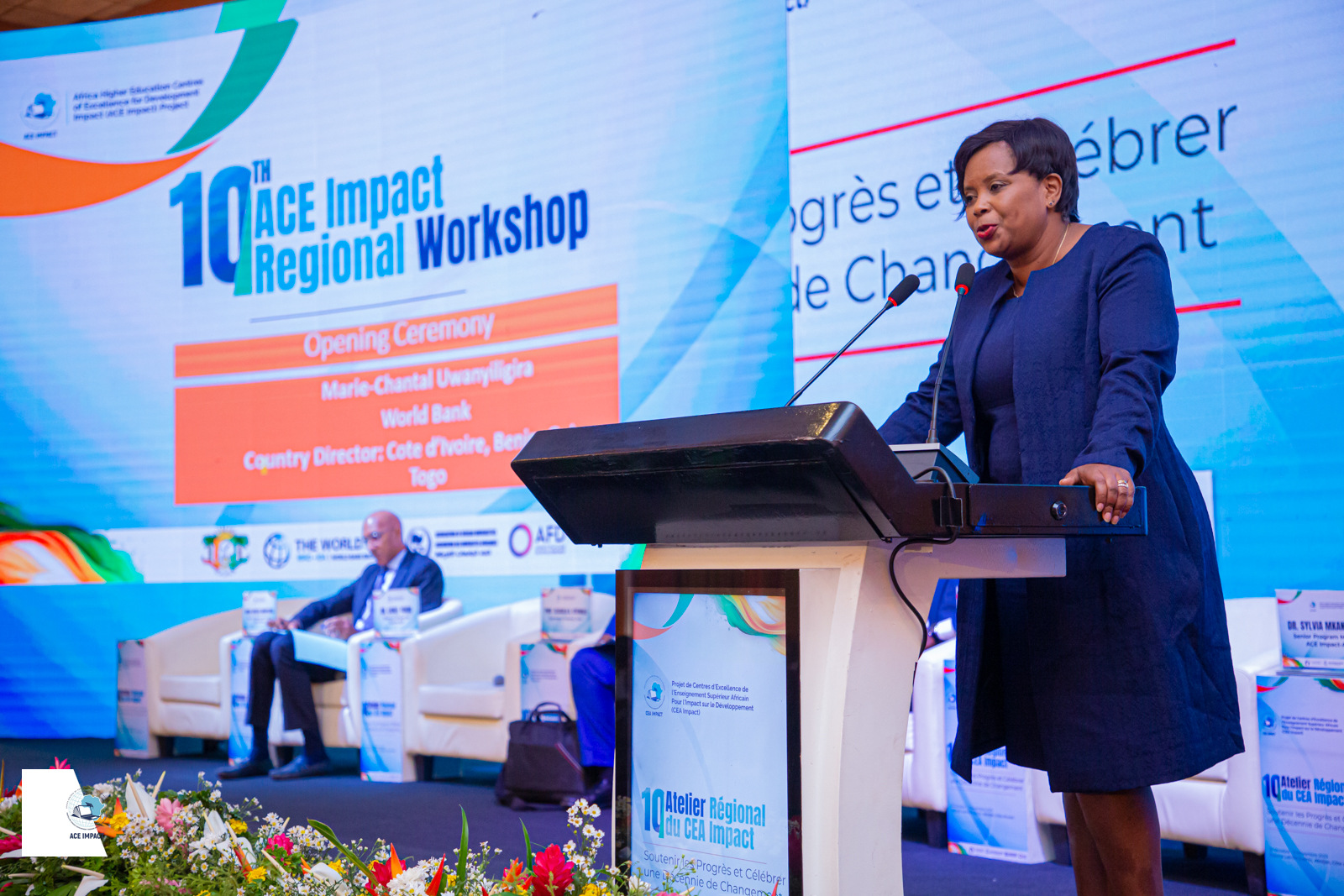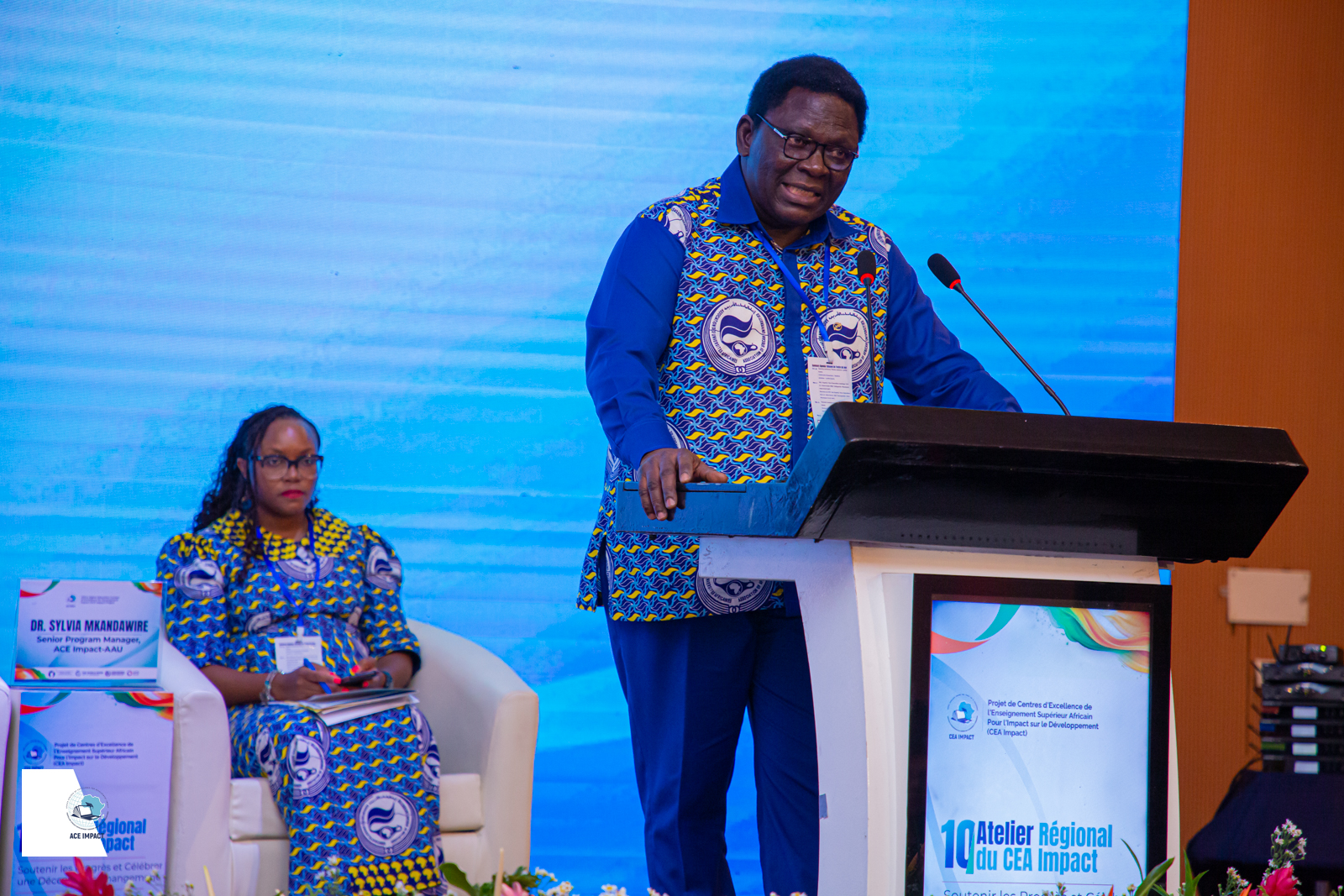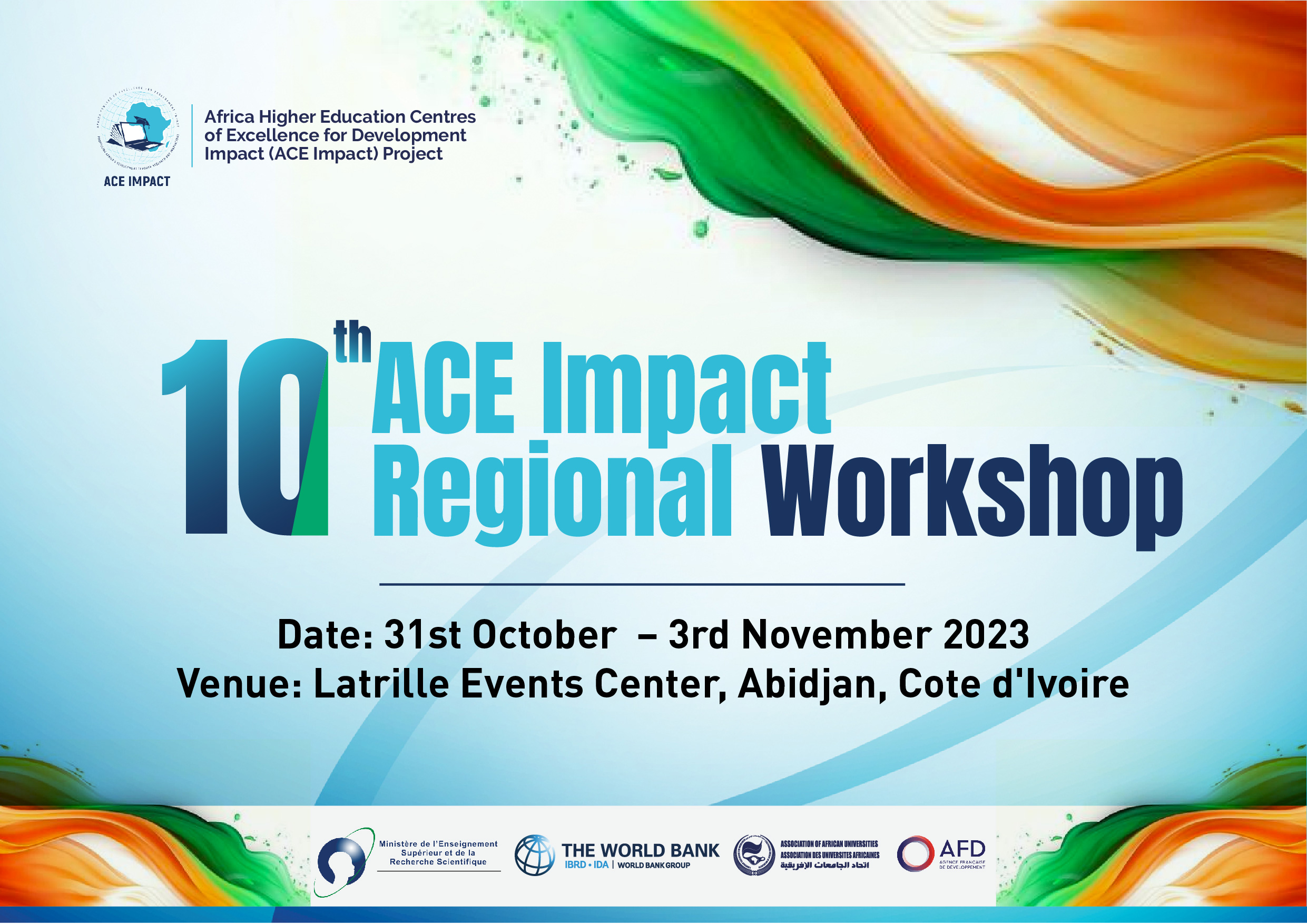Over 400 delegates from 23 countries have convened in Abidjan, Cote d’Ivoire for the 10th ACE Impact Regional Workshop, marking a critical milestone in the project’s pursuit of advancing higher education excellence in Africa. The workshop, taking place from October 31st to November 3rd, 2023, has brought together vice-chancellors, project teams, subject matter experts, government representatives from various African countries, policy think tanks and other stakeholders. High-level government officials from Cote d’Ivoire graced the workshop with their presence at the opening ceremony. The central theme of sustainability is at the forefront of discussions as the project progresses towards its culmination in 2025.

Co-organised by the French Development Agency (AFD), the World Bank Group, and the Association of African Universities, in collaboration with the Ivorian Ministry of Higher Education, the workshop’s hybrid format combines virtual and onsite activities. The opening and closing ceremonies are being held at the Latrille Events, whiles other key workshop activities, including plenary, parallel sessions and steering committee and experts’ meetings, will be held from November 1st –2nd, 2023 at the Noom and Movenpick Hotels concurrently. The opening ceremony witnessed a compelling address by Mrs. Marie-Chantal Uwanyilligira, the World Bank Country Director for Cote d’Ivoire, who highlighted the critical role of Africa’s youth population. She underscored the projection that by 2050, Africa’s population will reach close to 2.5 billion, representing 35% of the world’s population and having the largest share of youth globally. The heightened need to leverage the opportunities presented and change the ‘youthquake’ into an opportunity was said to be critical. ‘Timely, deliberate and purposive actions must be taken now to harness this demographic advantage effectively’ – said Mrs. Marie-Chantal.
Already, numerous successes of Africans solving Africa’s developmental challenges through innovations exist, as evidenced by the ACE Impact project, demonstrating that indeed, ‘Africa can’. The data demonstrates the remarkable strides the centres of excellence have made in addressing the continent’s most pressing needs and continue to do so in impactful ways. Since 2014, Centres have trained 71, 987 students, published 8,528 research articles, and raised USD 170 million of externally generated funds. They now host over 116 internationally accredited programmes.
Education, research, and innovation were said to be pivotal in attaining a SMART economy and therefore needed to be prioritised and placed at the core of capitalising Africa’s demographic transition. Mrs. Marie-Chantal indicated that Gross Domestic Product (GDP) is positively correlated with levels of education, STEM education and scientific output, thereby investment in Science, Technology, Engineering and Mathematics (STEM) education and the encouragement of girls to take up studies and careers in the STEM fields needed to be promoted to boost country GDP. Moreover, it was added that the ACE Impact project goes beyond training and graduating students, to innovating and driving solutions to Africa’s challenges. Stakeholders were invited to partner with the project teams and join in transforming Africa.

The workshop was officially opened by Prof. Arsène Kobéa, the Director of Cabinet of the Minister of Higher Education, who reiterated the numerous benefits of investing in human capital. He emphasised the need to strengthen collaboration between governments and academic institutions to overcome key challenges faced by their economies. Prof. Kobéa called on African countries to promote sustainability and ensure that the various phases of the project, continue to drive innovation and economic growth. Commending the efforts of the ACE Impact project’s facilitators and funders, he urged all stakeholders to contribute synergistically to building a stronger and more resilient continent.
Prof. Olusola Bandele Oyewole, the Secretary General of the Association of African Universities, underscored the importance of project sustainability, and encouraged robust collaboration and partnerships. He acknowledged the Ministry of Higher Education in Cote d’Ivoire for its pivotal role in hosting the workshop and recognised the unwavering commitment of government representatives, subject matter experts, the World Bank Group, AFD, AAU, and the 53 participating centers.
Highlighting the significance of the workshop, Prof Oyewole emphasised that “the workshop serves as a vital platform to assess the Africa Higher Education Centers of Excellence project’s progress while providing the avenue for the sharing of knowledge, experiences, and innovations. The project’s collaborative spirit and innovation have had a profound impact, not only on academia but also on Africa’s socioeconomic and technological evolution”.
Prof. Oyewole encouraged participants to form robust collaborations and strategic partnerships with industry, governments, and international organizations, to leverage existing resources and expertise, citing that the trajectory of higher education and its role in sustainable development hinges upon the combined efforts of all stakeholders. The Association of African Universities’ commitment to supporting the various key components of ACE Impact and the common goal of advancing higher education in Africa was reaffirmed. He also encouraged the pursuit of funding opportunities from diverse sources to sustain and expand the programme beyond the World Bank and AFD funding.

Representing the French Development Agency, (AFD), Mr. Lionel Yondo, the Regional Director for Gulf of Guinea, urged stakeholders to harness Africa’s geographical dividends and the various opportunities. He highlighted the transformative role of the 53 centres in achieving tangible results across various thematic areas. Emphasizing the achievements of the centres in the areas of scientific publications in high-impact journals, number of PhDs trained, attraction of externally generated funds, among others. Mr. Yondo stressed the need for close collaboration with governments and the effective leverage and use of stable resources.
The workshop came to a close with the official launch of the 10-year Anniversary of the ACE Impact project (ACE@10), which will be celebrated in 2024 to mark a decade of remarkable achievements and contributions to Africa’s development.
